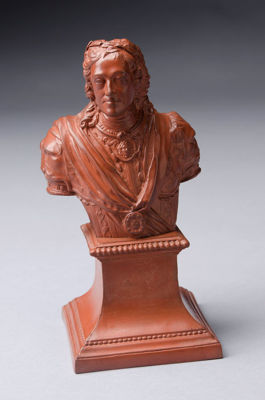Wedgwood
Title: Bulldog in Black Basalt
Bulldog from the celebrated English ceramic firm, modelled by Ernest Light and completed in black basalt with distinctive glass eyes in the early 20th century. Josiah Wedgwood introduced into production a black stoneware body in 1768. The first trials for Wedgwood's new black body had begun by July 1766, even before the move to Etruria. By September 1767 his experiments were at an advanced stage, ready for production, and less than twelve months later black basalt wares were on the market. He called it ‘Black Basaltes'; we know it as black basalt. Made from reddish-brown clay which burned black in firing, this ceramic body was superior in its appearance to the local 'Egyptian Black' wares produced in the area prior to that date. Provenance: Property of the Saint Louis Art Museum, Sold to benefit the acquisition fund.
Title: Bust of George II - Rosso Antico
Rosso Antico Bust of George II, England, non-period and non-factory, the bust mounted atop a tapering square plinth, impressed spurious Wedgwood marks, ht. 8 in. Literature: Ars Ceramica, number 11, 1994. Provenance: Property of the Saint Louis Art Museum, Sold to benefit the acquisition fund.
Title: Caneware Octagonal Plate
Early 19th century Wedgwood plate, in Caneware with applied Rosso Antico fruiting vines in relief. The tan-coloured, unglazed stoneware was relatively rarely used for decorative or display objects over the period, more commonly used for cooking utensils or serving dishes — particularly a selection of game pie dishes — as Josiah Wedgwood recognised the ware’s potential for simulating an impression of pastry crust. Provenance: Property of the Saint Louis Art Museum, Sold to benefit the acquisition fund.
Title: Canopic Jar - Green Jasperware Dip
Wedgwood Green Jasper Dip Canopic Jar and Cover, England, 19th century, applied white bands of hieroglyphs and zodiac symbols in white relief, impressed mark, ht. 9 1/2 in.
Title: Cat in Black Basalt
Cat from the celebrated English ceramic firm, modelled by Ernest Light and completed in black basalt with distinctive glass eyes in the early 20th century. Josiah Wedgwood introduced into production a black stoneware body in 1768. The first trials for Wedgwood's new black body had begun by July 1766, even before the move to Etruria. By September 1767 his experiments were at an advanced stage, ready for production, and less than twelve months later black basalt wares were on the market. He called it ‘Black Basaltes'; we know it as black basalt. Made from reddish-brown clay which burned black in firing, this ceramic body was superior in its appearance to the local 'Egyptian Black' wares produced in the area prior to that date.







